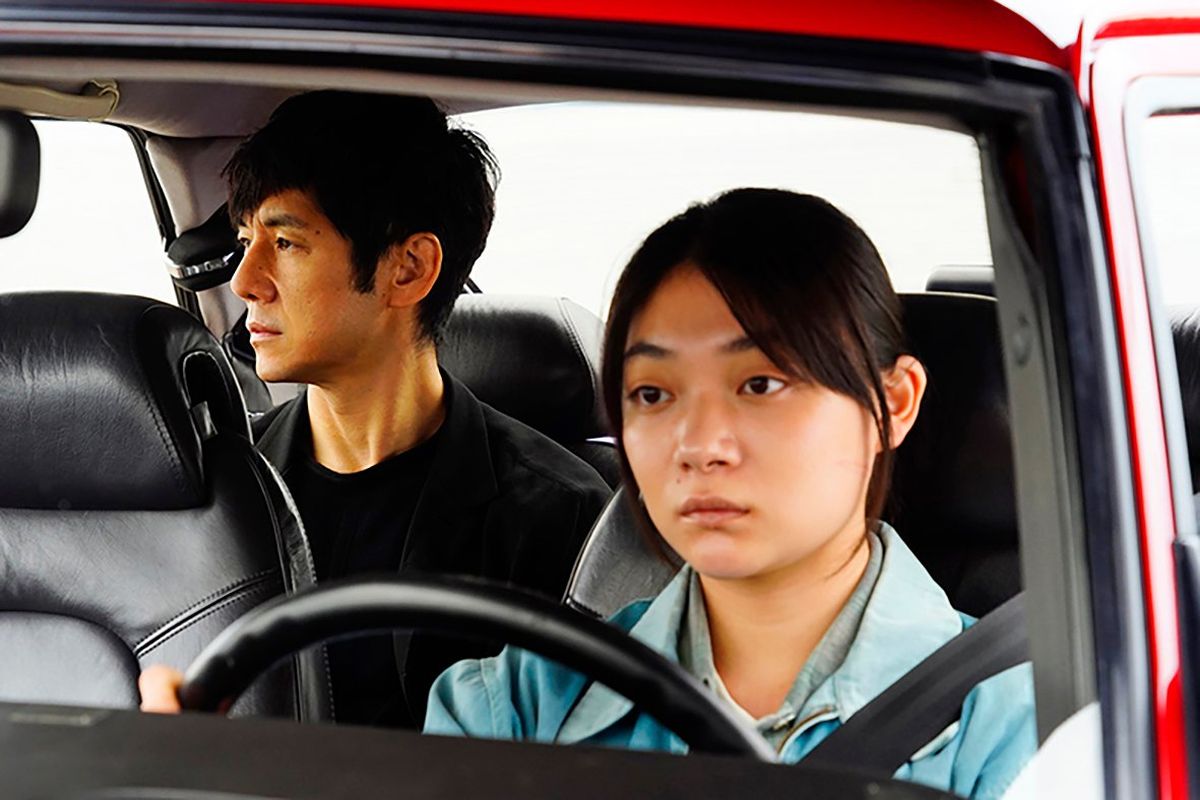Review: ‘Drive My Car’ takes you on a ride to a place of profound and poetic beauty

As suggested by the title of “Drive My Car,” Japan’s official submission to this year’s Oscars, large parts of the three-hour film take place inside an automobile in which a man is being chauffeured. But this is no claustrophobic, single-setting psychological thriller, like the masterfully car-bound “Locke.” Rather, it feels as expansive as the whole world.
A small part of that is because of that man in the back seat, Yusuke (Hidetoshi Nishijima), is an actor and theater director known for experimental productions that feature an international, multilingual cast, all of whom recite their dialogue in their own tongues, with supertitle translations projected above the stage.
At the heart of the story, Yusuke is participating in a residency at a Hiroshima theater festival, in which he’s directing Chekhov’s “Uncle Vanya” with such a polyglot cast, one of whom (Park Yurim) communicates using Korean sign language. Her dialogue, onstage and off, is a kind of beautiful hand dance interpreted by her husband Yoon-su (Jin Daeyeon), the play’s Korean dramaturge, who notes that his wife isn’t deaf.
In its quiet way, “Drive My Car” is a story about listening, or, in a larger sense, paying attention, and it invites you to do the same. Yusuke spends his time in the car listening to a tape of “Vanya” that his wife Oto (Reika Kirishima) once made for him when he was memorizing his lines for the title role in that play. Now, as the show’s director, being ferried back and forth from hotel to theater by the taciturn young woman named Misaki (Toko Miura) who has been hired to drive Yusuke’s beloved red Saab, Yusuke listens for ways in which the play, as he puts it, “questions” him.
But “Drive My Car,” which director and co-writer Ryusuke Hamaguchi has loosely adapted from a short story by Haruki Murakami, isn’t just about listening, but healing and the transformative, terrifying and awesome power of art. Both Yusuke and Misaki are broken. We learn, from the film’s first act, that Oto has died and she had betrayed her husband before that.
This section of the film is presented as a kind of lengthy, curtain-raising prologue to the main action, and the opening credits don’t even appear until almost 45 minutes into the story. What we know about Oto, a TV writer, is that she and Yusuke were creative collaborators of a sort: Oto, after lovemaking, would begin reciting a story out loud, as if in an erotic trance, but would forget its details the next day, until Yusuke would remind her, and even expand upon them. Finishing each other’s tales is another large, potent theme here.
We won’t learn about Misaki’s wounds – including the noticeable scar on her cheek – until much later as the driver and her passenger discover what they share. Meanwhile, rehearsals for “Vanya,” a play about a misanthrope learning to persevere through suffering, continue, with Yusuke casting a TV star named Koshi (Masaki Okada) in a title role for which he is in some ways unfit: Koshi is too young, and he has a history with Yusuke’s wife – and an impulsive tempter – that will trouble the waters, personally and professionally.
There is so much going on here, yet the director handles the film’s constellation of themes and sweeping emotion with impeccable assurance and an at-times breathtaking sense of the poetic. When Yoon-su explains to Yusuke why the dramaturge and his wife moved to Japan from South Korea – where she was more comfortable, linguistically, and had a support network of people who understood her signing – he says: “I could listen to her like a hundred people.”
In the lead roles, Nishijima and Miura headline a solid supporting cast, evincing a connection that transcends their characters’ large age difference: Yusuke is in his 50s and lost a daughter to illness many years ago – one who would have been 23, Misaki’s age, had she survived.
It feels trivializing to call their strange bond merely love because, in “Drive My Car’s” universe, it feels like something so much bigger and deeper. Call it trust. Call it letting go. Call it forgiveness, of oneself, as well as others. Call it a connection forged by the power of storytelling, which is something that you, as the film’s audience, also will experience.